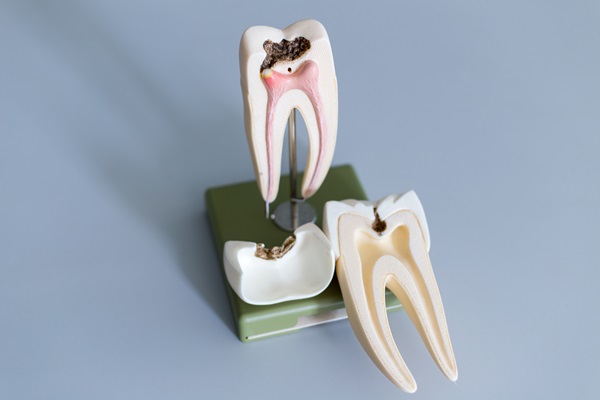Root canal therapy is a commonly performed dental treatment that is used to treat infection or swelling of the pulp tissues inside a tooth. A tooth’s pulp is the blood vessels and nerves in its innermost layer called the pulp chamber. It is sealed off from the rest of a tooth to protect its sensitive contents from irritants in the mouth like bacteria and saliva.
Dentists typically recommend root canal therapy as a last resort for patients who have teeth with compromised pulp chambers. The procedure has a poor reputation as one of the most painful procedures done by dentists, but that could not be further from the truth since local anesthetics are used to numb the area being worked on during the procedure. Most patients do not feel significant pain during root canals, and the tooth pain that brings people to the clinic is typically gone once the procedure is completed.
Reasons to consider getting a root canal
Some of the reasons why a patient might need a root canal to save a tooth include:
1. Significant tooth decay
Tooth decay is one of the leading reasons people seek dental care, and it does not go away until the issue is addressed. Tooth decay occurs in multiple stages, starting with a demineralization stage that can be reversed with fluoride treatments and ending with the destruction of a tooth.
Root canals are typically recommended as a treatment for tooth decay when the decay is so severe that it opens up the pulp chamber, exposing the soft tissues in it to irritants in the mouth. During the procedure, the decayed parts of the tooth are removed as well as the tissues in the pulp chamber. Medication is inserted into the chamber before sealing it off with gutta-percha.
2. Tooth infection
A tooth infection is another common reason why a dentist might recommend endodontic therapy. Tooth infections typically develop after a tooth’s pulp chamber has been opened up by decay or damage. Bacteria make their way into the pulp chamber, infecting the tissues there.
This often leads to some of the worst toothaches imaginable that make it impossible to concentrate on anything or get any sleep at night. Root canals stop tooth infections in their tracks and help to avoid having to extract the tooth to stop the infection from spreading to areas where it can be life-threatening.
3. Severe structural damage
A tooth’s pulp chamber can be opened up by trauma caused by accidents, hard contact, or slips. Any damage that leaves the pulp chamber open is classified as a dental emergency, and it requires endodontic therapy to save the tooth and prevent infection.
4. Tooth abscess
A tooth infection sometimes spreads beyond the pulp into the soft and bone tissues surrounding a tooth’s root. An infection in these areas is called an abscess, which often requires root canal therapy along with other treatments to rectify.
Let us save your tooth
Root canals bring an end to some of the worst toothaches you can imagine while helping to save damaged teeth. Call or visit our Houston clinic to find out if you need the procedure performed on one of your teeth.
Request an appointment here: https://dentisthouston4smile.com or call Smile Designers at (281) 947-0551 for an appointment in our Houston office.
Check out what others are saying about our dental services on Yelp: Root Canal in Houston, TX.
Related Posts
3 Tips to Prepare for Root Canal Treatment
Root canal treatment is often the first line of defense for treating teeth with compromised pulp chambers. The pulp chamber is the innermost layer of a tooth, and it stores nerves, blood …
3 Signs You May Need a Root Canal
Dentists use root canals to save teeth that are badly infected. Sometimes, due to damage or decay, the inner part of the tooth becomes infected. However, the tooth may not have to …
Can a Root Canal Save a Tooth?
If the root canal treatment of a tooth is infected, you need to visit a dentist as soon as possible. Endodontic treatment, commonly called root canal therapy, entails repairing a damaged and …
Can a Root Canal Fail?
Needing to get a root canal but heard that they can fail? Yes, it is true that root canal therapy can fail. While this may be a little disheartening for you to hear, understand that …






